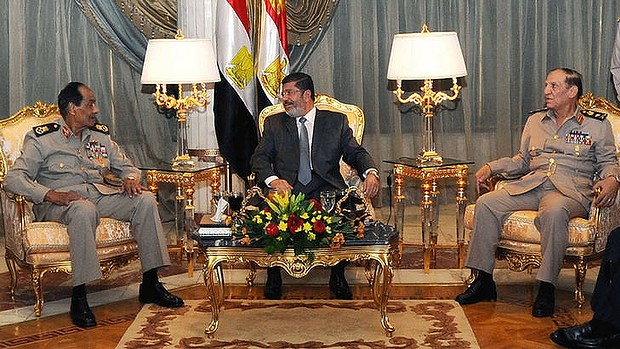Hussein Tantawi dismissed as Egyptian president extends powers, with showdown predicted at constitutional court. he Egyptian president, Mohamed Morsi, has dismissed his military chief as part of a sweeping set of decisions that includes the appointment of a vice-president and the rescinding of a military order that curbed presidential powers.

Presidential spokesman Yasser Ali announced the retirement of Hussein Tantawi, head of the armed forces, and the chief of staff, Sami Anan. They have been appointed as advisers to Morsi.
The president also cancelled the complementary constitutional declaration issued by the Supreme Council of the Armed Forces (Scaf), announced days before he was declared the victor in June’s elections. The addendum had curbed presidential power and kept much of it in the hands of the military council.
“This sets up an inevitable showdown with the supreme constitutional court as the court is likely to attempt to overturn Morsi’s cancelling of the supplemental constitutional declaration. It seems this move will require the sacking of the court if it is to stand,” said Michael Hanna, a fellow at the Century Foundation, a US thinktank.
The decisions follow an attack by unidentified assailants on a police station in North Sinai that resulted in the death of 16 policemen on 6 August. The incident triggered further clashes between security forces and militants in the peninsula and led to the Egyptian chief of intelligence, Mourad Mowafi, being removed, along with other senior security figures.
Morsi’s move on Sunday marks the latest blow in a tussle between the Muslim Brotherhood and the military over control of post-transitionalEgypt. The decision to remove Tantawi and Anan was taken in consultation with Scaf, including Tantawi, the new deputy minister of defence, Mohamed el-Assar, told Reuters.
Replacing Tantawi is the head of military intelligence, Abdel-Fatah el-Sissi – one of the generals who defended the use of “virginity tests” against female protesters in March 2011 – with El-Assar as his deputy. The new chief of staff is General Sidqi Sobhi Sayed. The appointments are all members of Scaf.
Tantawi and Anan were honoured with accolades, Tantawi receiving the highest medal in the country, the Order of the Nile, and Anan also receiving a medal, which has led to speculation that rather than indicating a face-off, this latest move comes as part of the “safe exit scenario” that would see Scaf members leave office without fear of prosecution for crimes committed against protesters during their tenure, including when army APCs ran over Coptic Christian protesters on 9 October 2011, killing 27.
“What is happening now was planned once Scaf realised they had to make a deal with the Brotherhood anyway,” said Sherif Azer, deputy director of the Egyptian Organisation for Human Rights. “This moment where Scaf would fade back into the background was expected, and I believe that they knew this was their best option for a safe exit, just fade away from the political realm.”
Revolutionaries who participated in the ousting of the former president, Hosni Mubarak, in 2011 have remained opposed to the military throughout the transitional period, and have criticised the Muslim Brotherhood for what they see as the party’s willingness to forgo the revolution in return for political gain. Gigi Ibrahim, a member of the Revolutionary Socialists group, said: “Morsi and Scaf joined forces in the face of the revolution to simply crush and control Egypt.”
With these latest decisions, and the continued absence of an elected parliament, legislative powers revert from Scaf to Morsi. The president also decreed that fresh parliamentary elections would take place 60 days after a new constitution is ratified in a popular referendum.
A constituent assembly was formed to draft the constitution and, if the current assembly fails to come up with a draft, Morsi now has the power to appoint a new assembly to draft Egypt’s future constitution.
The president also appointed senior judge Mahmoud Mekki as his vice-president. Mekki was a senior figure in the independent judges movement during the Mubarak era that agitated for more judicial independence. Morsi had promised that his two first appointments would be Coptic Christian and female vice-presidents.



